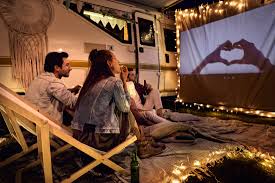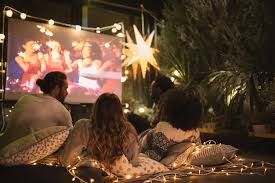Introduction: The Appeal of Movie Nights
Movies have always been more than entertainment. They are stories that inspire, provoke thought, and bring people together. Over the past few decades, the tradition of Movie Nights has grown into a cultural movement that fosters community and strengthens social bonds. Whether held in a café courtyard, a public park, or an urban rooftop, MovieNights provide people with opportunities to share cinematic experiences in an atmosphere of togetherness.

This article explores the growing influence of MovieNights, their historical context, cultural value, and how they continue to shape community life in cities around the world.
The Origins of Movie Nights
Early Cinema Gatherings
The idea of watching films together is as old as cinema itself. In the early 20th century, silent films brought crowds into theaters where the experience was communal rather than individual. Movie palaces of the 1920s became cultural hubs where communities gathered.
Outdoor Screenings and Pop Culture
By the mid-20th century, drive-in theaters in the United States symbolized the golden age of communal cinema. Families, friends, and couples would gather in their cars to enjoy films under the stars. This spirit later evolved into modern outdoor screenings and community-driven MovieNights.
Why Movie Nights Matter Today
Strengthening Community Ties
In an age where streaming platforms encourage solitary viewing, MovieNights revive the joy of watching films as a group. The laughter, gasps, and discussions that follow create bonds that digital platforms cannot replicate.
Accessibility and Inclusion
Unlike expensive multiplex tickets, community MovieNights are often free or low-cost. They make cinema accessible to everyone, regardless of income or background, ensuring inclusivity.
Cultural Exchange
MovieNights often showcase diverse films—from Hollywood blockbusters to local documentaries and international cinema. They introduce audiences to new perspectives and cultures, fostering global awareness within local communities.
Types of Movie Nights
1. Outdoor Cinema Experiences
Parks, beaches, and rooftops are increasingly used as venues for open-air screenings. These settings combine the magic of cinema with the beauty of nature.
2. Themed Film Nights
Venues curate films around specific themes—romance, horror, documentaries, or classics—offering audiences tailored experiences that appeal to their interests.
3. Community-Driven Screenings
Local organizations and cafés often host MovieNights to support grassroots filmmakers and highlight community issues. These events emphasize dialogue and participation.
4. Film Festivals and Marathons
Extended MovieNights in the form of festivals or marathons provide opportunities to celebrate genres, filmmakers, or cultural milestones.
The Social and Economic Impact of Movie Nights
Boosting Local Economies
Movie Nights attract attendees who spend money on food, drinks, and nearby businesses. Vendors, artisans, and small restaurants often benefit from increased foot traffic.
Creating Safe Social Spaces
They provide safe and family-friendly environments where people can gather in the evenings. This contributes to urban vibrancy and community wellbeing.
Encouraging Creative Industries
Local filmmakers and artists gain exposure through community screenings, strengthening the cultural ecosystem and encouraging creative growth.
Case Study: Ariantze Side Walk and Movie Nights
Ariantze Side Walk in Georgetown demonstrates how Movie Nights can become part of a café’s identity. By combining food, drink, and cinema, the venue transforms into a cultural hub. These screenings attract not only locals but also tourists seeking authentic cultural experiences.
The success of Ariantze Side Walk shows that Movie Nights can do more than entertain—they can brand a business as a leader in community culture.
Challenges of Hosting Movie Nights
Licensing and Permissions
Public film screenings require licenses, which can be costly. Organizers must navigate legal frameworks to ensure compliance.
Weather and Logistics
Outdoor screenings face challenges like rain, noise control, and technical issues with sound or projection. Careful planning is essential.
Competition with Digital Platforms
With streaming services offering instant access to films, Movie Nights must focus on creating experiences that cannot be replicated at home.
The Role of Technology in Movie Nights
High-Quality Equipment
Advancements in projectors and sound systems have made it easier to deliver cinema-quality experiences outdoors.
Digital Promotion
Social media platforms play a crucial role in promoting Movie Nights. Event pages, hashtags, and live updates attract larger audiences.
Hybrid Events
Some Movie Nights are streamed simultaneously online, allowing participation from those unable to attend in person while maintaining the communal spirit.
The Future of Movie Nights
Sustainability and Eco-Friendly Practices
Eco-conscious organizers are adopting sustainable practices such as solar-powered projectors, reusable cups, and zero-waste initiatives.
Expansion into New Spaces
As cities evolve, unconventional venues—abandoned warehouses, art galleries, and community rooftops—are being transformed into screening locations.
Greater Community Participation
Crowd-sourced film selections and interactive discussions after screenings are becoming more common, strengthening the role of Movie Nights as participatory cultural experiences.
Conclusion: The Enduring Power of Shared Cinema
Movie Nights remind us that cinema is not only about the films themselves but also about the experiences we share. They create memories, spark conversations, and build communities. In a world where technology often isolates, Movie Nights bring us back to the collective joy of storytelling.
Whether in a bustling city square or a small community café, Movie Nights continue to inspire, entertain, and unite. They are proof that the magic of movies is not just on the screen but in the people who watch them together.

